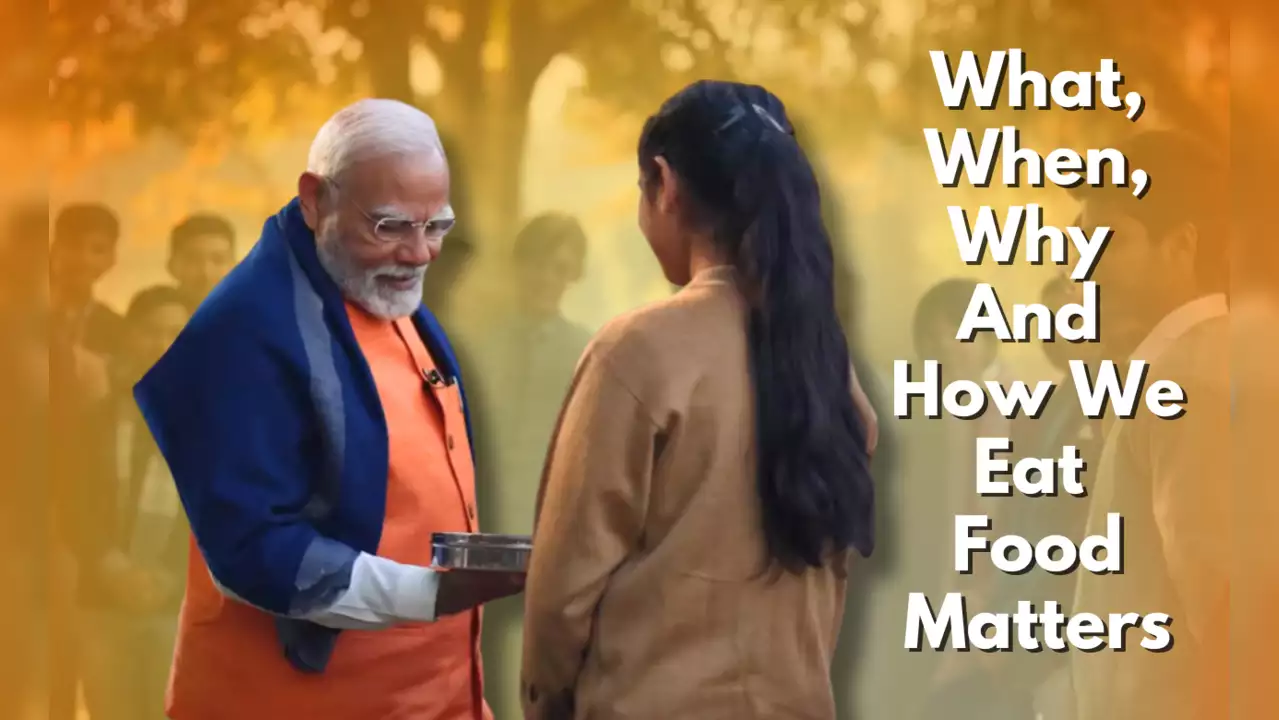Ishita Roy • 11 Feb 2025
Pariksha Pe Charcha 2025: What, When, Why And How We Eat Food Matters, Says PM Modi

PM Modi offers Til Ke Ladoo to students as he speaks with them in Pariksha Pe Charcha 2025
The 8th edition of Pariksha Pe Charcha introduced a new format where students indulged in a candid conversation with PM Modi during exams. This Pariksha Pe Charcha 2025 took place in the open, where students along with the Prime Minister soaked up the sun, and meditated together listening to the sounds of birds chirping in Delhi's Sunder Nursery.
Addressing students' concerns around exams, education and careers, PM Modi also stressed on the importance of food habits and how healthy food habits help with concentration. Moments before the conversation began, PM Modi offered Til Ke Ladoo, (a delicacy made with sesame seeds with jaggery). It is believed that it helps one focus better and improves cognitive functions. Studies too have proven that sesame seeds are indeed a nutritional powerhouse. As per a 2019 study published in Nutrients, sesame lignans, which are found in sesame seeds are known to have neuroprotective effects in several models of brain dysfunctions. Which means sesame can suppress cognitive decline. Furthermore, sesame seeds also contain calcium, and magnesium, which help control plod pressure, and their anti-oxidant properties work against oxidative stress and prevent any chronic diseases. It also produces serotonin, which improves sleep patterns, which the PM emphasis is important to regulate so the focus is optimal when needed.
PM Modi further focuses on the Ws and Hs of food. He emphasises knowing the reason why we eat certain foods, what we eat when we eat and how we consume them.
What Foods To Eat
Talking about food, he stresses the importance of eating right to support health. "Absence of illness does not mean we are healthy", he says. He says that just because one is not down with a fever does not mean that the person is healthy. The person may be struggling with other issues, the most common one, during exams is maintaining a healthy sleep schedule.
Students too agreed that it is during the preparation when they feel most sleepy.
The solution is simple: Know what to eat and what not to. He focuses on the superfood millet and the importance of consuming seasonal fruits. Since this is the season of carrots, he emphasises their consumption, as studies have also shown that they help with brain health.
In what to not eat, there are three major food items:
- Junk Food
- Oily Food
- Maida
There have been studies, including a recent one published in 2024 by Maryam Khazdouz, et.al., that note the adverse effects of junk and fried foods on the risk of attention deficit hyperactivity disorder (ADHD). There are many studies that also bring out the adverse effects of processed, fried and junk food on cognitive function.
When To Eat Your Food
Speaking to the students present he also focuses on the eating timings. PM Modi tells students that most of the rituals are deeply rooted in science, including the ritual of eating early. He also narrates instances of farmers who eat early in the morning and finish their dinner before sundown.
As per Northwestern Medicine and many other studies, the best time to eat is indeed early morning, while dinner must be done by 5pm. The rule is to allow four to five hours between lunch and dinner. An early dinner time also allows the body ample time to digest food before bedtime.
Why Do We Eat What We Eat
PM Modi also focuses on mindful heating to know the reason why we consume what we consume or why we do not consume certain things. This is closely related to the "what" list which was discussed at the beginning of the conversation. Furthermore, many studies, including a 2012 study published in Science Direct note the motivation to choose the food items and how it affects one's mind and body.
How We Eat Our Food
The last step in mindful eating that PM Modi also talks about is 'how to eat'. Talking to the students, he says that the reason we have 32 teeth is that we chew our food 32 times. The way we eat food is linked to how it helps your body absorb the nutrients and digest the food. Chewing makes food portions small and thus the gastric juices in the stomach can further degrade it and reduce to a microscopic size for better digestion.
Get Latest News Live on Times Now along with Breaking News and Top Headlines from Health and around the world.